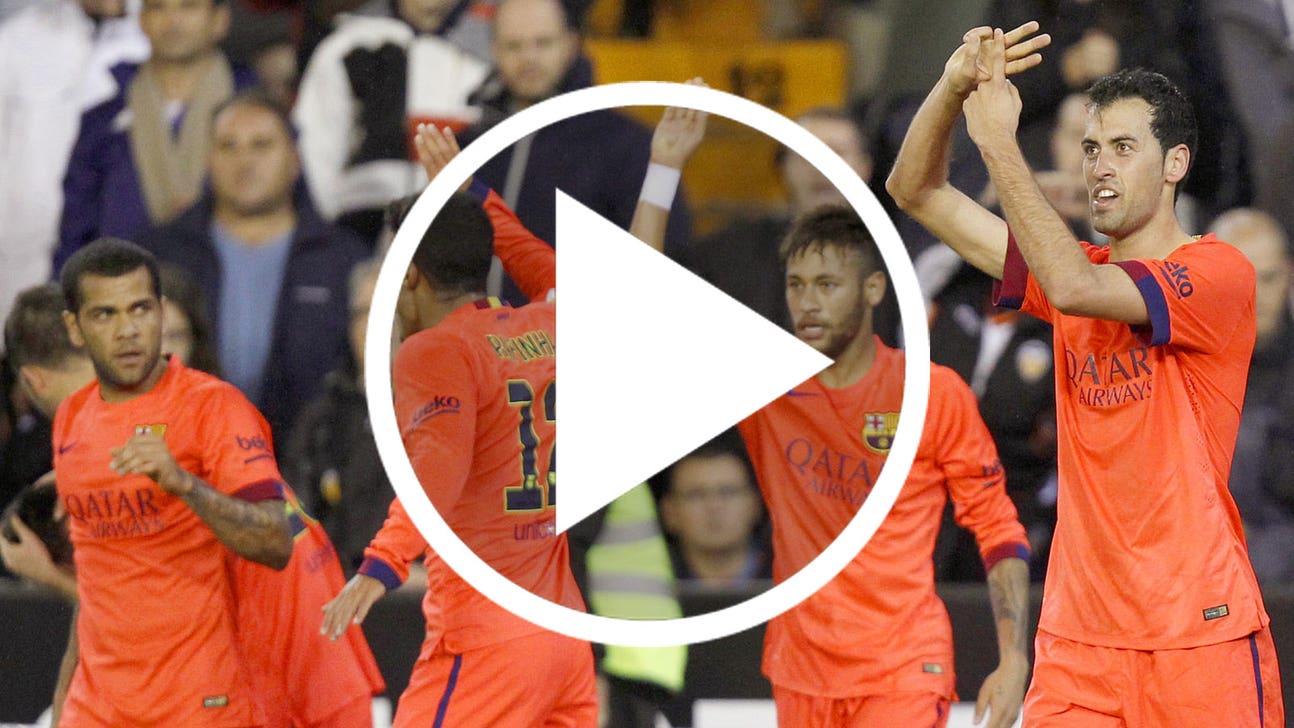
Sergio Busquets the surprise hero in Barcelona's double pivot

MADRID --
Spanish football has given the global game of soccer many positive impulses. Lately, most of them are to do with tactical enterprise and technical flair. But not so long ago, it from Spain, and from Spanish, that the phrase "doble pivo"' entered the global game's jargon, as a description for two-man layer of midfield where the ball was won tigerishly and distributed efficiently.
Double pivots were key to a fashionable formation that took hold at the summit of European soccer around the turn of the millennium, the second tier in the 4-2-3-1 that Real Madrid used, in the years 1998 to 2002, to dominate the UEFA Champions League, and France employed to become supreme in international football. The double pivot was made up of a pair of deep midfielders with complementary passing skills, but whose fortes were in regaining the ball.
Fast forward to now, and a team lining up two midfielders whose main assets are as spoilers is generally deemed a conservative, timid team, especially among those Spanish clubs who regard themselves as in the vanguard of attacking, pro-active soccer. At Real Madrid, the days when Fabio Capello and Jose Mourinho, head coaches who enjoyed success but found it hard to persuade a section of purist madridistas their first instincts were not fundamentally cautious, occasionally fielded not two but three bruisers at the base of midfield, are remembered as low points. These were coaches, pundits howled, even prepared to unleash a monster, the so-called "trivot" -- a triple pivot -- and, in doing so, blemished the club's tradition of prioritizing panache.
So when Luis Enrique, Barcelona's head coach, named a midfield that included both the rugged Sergio Busquets and the terrier Javier Mascherano for Sunday's trip to Valencia, he anticipated some quizzical looks from the Spanish media. Both players are admired members of Barcelona's squad, Mascherano for his versatility -- he has played the majority of his Barca matches since joining from Liverpool four years ago as a central defender, rather than his preferred midfield designation and his courage and his speed. As for Busquets, he is the anchor midfielder par excellence, so good at intercepting, tackling, reading the rhythm of a game that he is his own "double pivot."
But neither of them are glamorous virtuosos. Put Busquets and Mascherano in midfield, and you invite the accusation that you, as coach, are sacrificing a club's birthright, giving up enterprise in favor of attrition. Worse, you can look fearful. And Barcelona had traveled to Valencia expecting a feisty encounter, one that might easily trip them up in their pursuit of La Liga leaders, Real Madrid. Sure enough, Valencia growled and snapped at their visitors. It was a gripping 90 minutes, and for 93 minutes it was goalless.
On the touchline Luis Enrique watched Busquets and Mascherano typically vigorous in their challenges. And for an hour he saw Barcelona launch a higher-than-usual number of long balls up to the forwards, and a team who, with Lionel Messi heavily policed by Valencia players, lacked the sort of intricate passing that is emblematic of modern Barca. The midfield double pivot, the Mascherano-Busquets pairing, left Xavi, their partner in that part of the pitch as the lone visionary, conspicuously the sole ambassador for tiki-taka soccer.
The new-look midfield lasted 70 minutes, at which point Mascherano withdrew to central defense, Ivan Rakitic came off the substitutes' bench and Barcelona looked more recognizable, more forward-thinking. Luis Suarez had a goal ruled out for a mistaken offside call, but they were not peppering the Valencia goal.
"This is a strong Valencia and they gave us a very hard game," acknowledged Busquets. He interpreted the unusually defensive midfield lineup as a necessary antidote to a Valencia "who were always going to try to use the counter-attack, so we needed control."
And Busquets said all this with a broad smile, because in the fourth minute of injury time, Barcelona did beat Valencia, thanks to a goal from a most unexpected source: Busquets himself, a man whose previous 190 La Liga matches from his hometown club had yielded a grand total of just four goals. This, his fifth since 2008, driven in from close range during the hectic follow-up to a set-piece, felt as precious as any.
"A draw was no good for us," reckoned Busquets of the significance of the goal. Barcelona had seen Madrid maintain their run of victories -- 16 in succession now in all competitions -- a day earlier with a 2-0 win over Malaga. The gap between Barca and Madrid stays at three points.
Madrid, incidentally, had lined up again with almost nobody in their midfield much resembling a single pivot, let alone a double pivot. That has become their trademark. Toni Kroos, better recognized for his passing vision than his tackling, remains their deepest midfielder, and the player who won most possession for Madrid, again, was Isco, who is a diminutive trickster and dribbler, but is also persuasively buying into Madrid coach Carlo Ancelotti's dictum that to win a place in his XI, every artist needs to roll up his sleeves and put in tackles.
Isco was even cheered off the field by supporters of Malaga, his former club, when he received an unjust red card late in the game. It was an unlikely circumstance in which to be hailed as a hero. But this was a weekend of surprising heroes, none more than the "super-pivot," the persistent, match-winning Sergio Busquets.